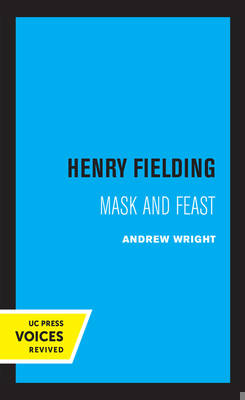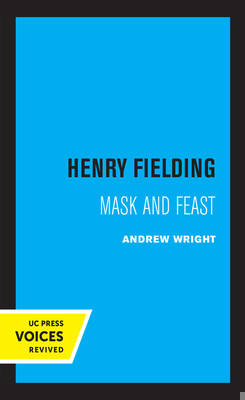
- Retrait gratuit dans votre magasin Club
- 7.000.000 titres dans notre catalogue
- Payer en toute sécurité
- Toujours un magasin près de chez vous
- Retrait gratuit dans votre magasin Club
- 7.000.0000 titres dans notre catalogue
- Payer en toute sécurité
- Toujours un magasin près de chez vous
Description
Henry Fielding: Mask and Feast by Andrew Wright offers a probing reevaluation of one of the eighteenth century's most inventive literary figures. Tracing Fielding's career as novelist, playwright, and satirist, Wright emphasizes the centrality of performance, festivity, and spectacle in shaping both Fielding's artistic method and moral outlook. Through close readings of Joseph Andrews, Tom Jones, and Amelia, the book demonstrates how Fielding transformed fiction from moral cautionary tale into comic epic, creating works that balance philosophical inquiry with theatrical flourish. By highlighting the motifs of mask and feast, Wright shows how Fielding's narratives orchestrate artifice and entertainment to illuminate the complexity of human motives and social life. This study situates Fielding at the intersection of neoclassical criticism, Augustan wit, and the emerging English novel, arguing that his artistry is best understood not as moral sermonizing but as a celebratory transformation of experience into art. Henry Fielding: Mask and Feast redefines Fielding's comic structures, from parody to epic comedy, while also attending to the darker tonal shifts of Amelia. Wright's analysis makes clear that Fielding's achievement lies in his ability to elevate comedy to the level of serious art, reconciling moral concern with literary play. Scholars of eighteenth-century literature, theater, and narrative theory will find here an indispensable exploration of how Fielding's fictions continue to shape our understanding of the novel as both entertainment and cultural critique. This title is part of UC Press's Voices Revived program, which commemorates University of California Press's mission to seek out and cultivate the brightest minds and give them voice, reach, and impact. Drawing on a backlist dating to 1893, Voices Revived makes high-quality, peer-reviewed scholarship accessible once again using print-on-demand technology. This title was originally published in 1965.
Spécifications
Parties prenantes
- Auteur(s) :
- Editeur:
Contenu
- Nombre de pages :
- 215
- Langue:
- Anglais
Caractéristiques
- EAN:
- 9780520316430
- Date de parution :
- 01-09-20
- Format:
- Livre broché
- Format numérique:
- Trade paperback (VS)
- Dimensions :
- 133 mm x 203 mm
- Poids :
- 226 g

Les avis
Nous publions uniquement les avis qui respectent les conditions requises. Consultez nos conditions pour les avis.






